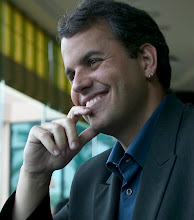David Pollock, a managing director at Bear Stearns and member of the Southern California angel investment group Tech Coast Angels, visited the APOC class this week. Interesting guy, thoughtful, and provided a nice overview for the class on the various steps of funding, the differences between friends and family, angels, and VCs, as well as being very open to answering questions about what he looks for and thinks about. I've been fortunate to meet a lot of investors during Second Life's development, as well as a larger group in the time since, but more information is always useful.
He had a few interesting data points and comments:
- He did a study at the Milken Institute that determined that 75% of the value in the US economy is the human capital
- 7 out of 10 venture investments fail completely
- LA area angels and VCs don't want seed funding to be spent on patent protection
As I explore the funding landscape, a couple of trends are jumping out.
First, Y Combinator (and its many copies) will generate a much broader exploration of Web 2.0 consumer services. As the number of available services becomes large, matching users to services will become a very interesting problem. What will take us beyond marketing, search engine optimization, and viral approaches? Will the news sites targeting this space, such as Tech Crunch, Mashable, Paid Content et al, take on a more of an aggregation role? Specialized search to help consumers find the services they want? Or, will service businesses emerge to build custom mashups, maybe using Yahoo Pipes?
Second, there may be a funding gap around the $200 - 400k level. Angels and some VCs, such as Charles River Ventures, are focused on this amount, but both face the challenge of being time consuming at a time in product development where a lost month or two to close funding is a significant percentage of total development time. Especially if the visionary founder is the one most distracted by the funding effort. A funder who really streamlined the process would meaningfully change the performance of their investments, since an extra month or two of progress 9 to 12 months into an idea could be the difference between having launched or not.
What I like about both trends is that solving them well requires a mix of search and reputation, both interesting problems to work on.

1 comment:
I have serious concerns about the veracity of the third point and comment. If you take money under those conditions, you can be accused of mismanagement if you don't take out patents later on. One of the many ways to be unseated.
Post a Comment